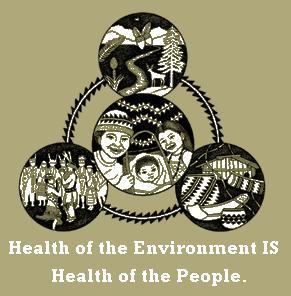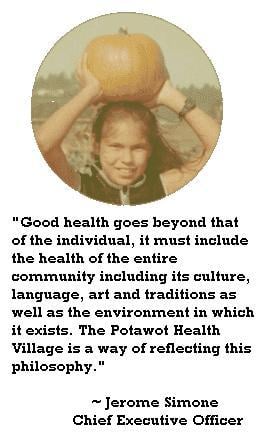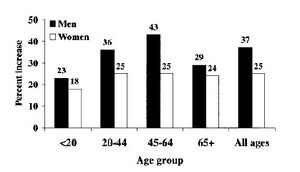No edit summary |
No edit summary |
||
| Line 15: | Line 15: | ||
====<u>How it works?</u>==== | ====<u>How it works?</u>==== | ||
Native | Native Americans that are members of the UIHS program, or enrolled in the Potawot clinic, have a wide variety of activities and information available to them. Members who have diabetes are provided with many different opportunities to stay healthy other than eating healthy. Their choices range from exercise to group sessions to one on one counseling. | ||
<p>Services and Information provided for members with diabetes include<nowiki>:</nowiki><ref name="Services">http://www.uihs.org/ | <p>Services and Information provided for members with diabetes include<nowiki>:</nowiki><ref name="Services">http://www.uihs.org/chw/services.html#a UIHS Services Last Accessed: 10/28/08</ref></p> | ||
:*Individual and Group fitness/movement programs. | :*Individual and Group fitness/movement programs. | ||
:*Diabetes Counseling. | :*Diabetes Counseling. | ||
| Line 25: | Line 25: | ||
:*Interpretation of blood tests and medication use. | :*Interpretation of blood tests and medication use. | ||
:*What you need to stay healthy and happy. | :*What you need to stay healthy and happy. | ||
:* | :*Support groups. | ||
:*Monthly luncheons. | :*Monthly luncheons. | ||
:*Group Education Classes. | :*Group Education Classes. | ||
:*Home visits. | |||
:*Diabetes Education and Support. | |||
:*Community Health Events. | |||
| Line 40: | Line 43: | ||
***Amputation rates among Native Americans are 3-4 times higher than the general population. | ***Amputation rates among Native Americans are 3-4 times higher than the general population. | ||
* You are more likely to develop type 2 diabetes if: <ref name="NDIC"> http://diabetes.niddk.nih.gov/dm/pubs/preventionprogram/index.htm NDIC Last Accessed: 10/28/08</ref> | * You are more likely to develop type 2 diabetes if: <ref name="NDIC"> http://diabetes.niddk.nih.gov/dm/pubs/preventionprogram/index.htm NDIC Last Accessed: 10/28/08</ref> | ||
**You are overweight | **You are overweight. | ||
**You are 45 years old or older | **You are 45 years old or older. | ||
**You have a parent, brother, or sister with diabetes | **You have a parent, brother, or sister with diabetes. | ||
**Your family background is African American, American Indian, Asian American, Hispanic American/Latino, or Pacific Islander | **Your family background is African American, American Indian, Asian American, Hispanic American/Latino, or Pacific Islander. | ||
**You have had gestational diabetes or gave birth to at least one baby weighing more than 9 pounds | **You have had gestational diabetes or gave birth to at least one baby weighing more than 9 pounds. | ||
**Your blood pressure is 140/90 or higher, or you have been told that you have high blood pressure | **Your blood pressure is 140/90 or higher, or you have been told that you have high blood pressure. | ||
**Your HDL cholesterol is 35 or lower, or your triglyceride level is 250 or higher | **Your HDL cholesterol is 35 or lower, or your triglyceride level is 250 or higher. | ||
**You are fairly inactive, or you exercise fewer than three times a week | **You are fairly inactive, or you exercise fewer than three times a week. | ||
[[Image:Graphof %.jpg|thumb|right|<ref>[http://care.diabetesjournals.org/cgi/reprint/23/12/1786.pdf Prevalence of Diabetes Among Native Americans and Alaska Natives, 1990–1997, December 2000]</ref>]] | [[Image:Graphof %.jpg|thumb|right|<ref>[http://care.diabetesjournals.org/cgi/reprint/23/12/1786.pdf Prevalence of Diabetes Among Native Americans and Alaska Natives, 1990–1997, December 2000]</ref>]] | ||
Revision as of 04:36, 29 October 2008


Diabetes Outreach Program
The Diabetes program available in Potawot covers nine tribes and more than 13,000 American Indians, consisting mainly of Yurok, Weeot and Tolowa Tribal members. [1] The Potawot program allows its participants to join groups that go on walks Monday –Wednesday during clinic hours. [2]Members of Potawot also have the opportunity to join Nutritional garden activities. The community food garden in Potawot consists of a two acre organic garden which produces 6-10 tons of fresh produce per year and is distributed to the Indian community through produce stands, baskets, and other gardening outreach programs.[3]
How it works?
Native Americans that are members of the UIHS program, or enrolled in the Potawot clinic, have a wide variety of activities and information available to them. Members who have diabetes are provided with many different opportunities to stay healthy other than eating healthy. Their choices range from exercise to group sessions to one on one counseling.
Services and Information provided for members with diabetes include:[4]
- Individual and Group fitness/movement programs.
- Diabetes Counseling.
- Foot Care Information.
- Diabetes education by Certified Diabetes Educators (CDEs).
- Instructions for review of blood glucose monitoring.
- Interpretation of blood tests and medication use.
- What you need to stay healthy and happy.
- Support groups.
- Monthly luncheons.
- Group Education Classes.
- Home visits.
- Diabetes Education and Support.
- Community Health Events.
Why they do it?
What are there reasons behind even offering this program
The Facts:
Interesting and Important Facts about the diabetes problem in the Native American culture.
- The risk of a leg amputation is 15 to 40 times greater for a person with diabetes. [5]
- Each year 54,000 people lose their foot or leg to diabetes. [5]
- Amputation rates among Native Americans are 3-4 times higher than the general population.
- Each year 54,000 people lose their foot or leg to diabetes. [5]
- You are more likely to develop type 2 diabetes if: [6]
- You are overweight.
- You are 45 years old or older.
- You have a parent, brother, or sister with diabetes.
- Your family background is African American, American Indian, Asian American, Hispanic American/Latino, or Pacific Islander.
- You have had gestational diabetes or gave birth to at least one baby weighing more than 9 pounds.
- Your blood pressure is 140/90 or higher, or you have been told that you have high blood pressure.
- Your HDL cholesterol is 35 or lower, or your triglyceride level is 250 or higher.
- You are fairly inactive, or you exercise fewer than three times a week.

Related Links
- Native Americans and Diabetes
- Eating Healthy
- Diabetes Epidemic Among American Indians
- Millions of American Indians at Risk
References
- ↑ http://pages.prodigy.net/richardspini/_wsn/page5.html Last Accessed 10/28/08
- ↑ Interview of Barbara Piefer from Potawot 10/28/08 (707) 825-4180 (Interviewed by Juliene Sinclair)
- ↑ http://www.uihs.org/ns/services.html UIHS Last Accessed: 10/28/08
- ↑ http://www.uihs.org/chw/services.html#a UIHS Services Last Accessed: 10/28/08
- ↑ 5.0 5.1 http://vltakaliseji.tripod.com/Vtlakaliseji/id2.html Vtla Kaliseji Last Accessed: 10/28/08
- ↑ http://diabetes.niddk.nih.gov/dm/pubs/preventionprogram/index.htm NDIC Last Accessed: 10/28/08
- ↑ Prevalence of Diabetes Among Native Americans and Alaska Natives, 1990–1997, December 2000